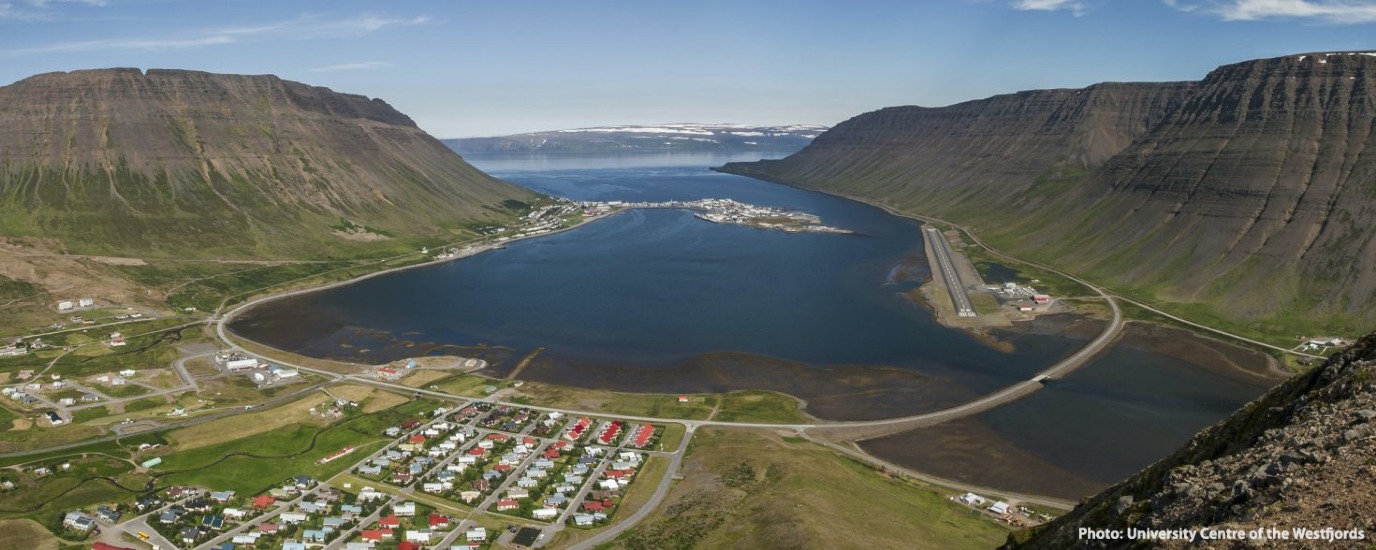Islands as Laboratories for Sustainability (ISLAs)

Methodologically and scientifically, islands serve as ideal 'laboratories' for examining the intricate interplay of environmental, social, and economic sustainability. Moreover, their isolated nature makes them key sites for exploring how remote communities adapt to the pressures of modern transitions, from environmental changes to socio-economic shifts.
Co-organised by the Erasmus Mundus Joint Master Islands and Sustainability (ISLANDS), the University Centre of the Westfjords, and the University of Iceland, the ISLAs Summer School 2025 will take place in person in the Westfjords of Iceland from June 28th to July 6th 2025.
During the summer school, participants will explore key topics around the transitions faced by remote island communities, with a focus on socio-economic adaptations, environmental sustainability, and cultural resilience. The Westfjords region of Iceland, with its striking natural beauty, sparse population, and history of remote community life, provides a compelling backdrop for this summer school. Participants will study these concepts academically and experience firsthand the realities of communities in transition. This immersive experience will deepen their understanding of sustainability, resilience, and the cultural challenges of remote living.
The main teaching activities will take place in the University Centre of the Westfjords in the town on Isafjörður, with excursions to local villages and natural sites. This provides a unique combination of academic engagement and real-world application, giving participants insights into the complex issues surrounding sustainability and resilience in remote island communities.
The main part of the ISLAs Summer School 2025 will take place from Saturday, June 28th to Sunday, July 6th starting in Reykjavík, the capital city of Iceland. The programme will also include a series of preparatory virtual tasks and meetings in June, and will formally conclude with the submission of a report due at the end of July.
Practical information
|
Dates
|
28 June – 6 July 2025
|
|
Location
|
Start and finish will be in Reykjavík, Iceland, from where transport to the main location in Isafjörður will be organised. We start early on the 28th of June at the University of Iceland in Reykjavík, return to the same location planned for the evening of the 6th of July.
|
|
Level
|
MA/MSc/PhD/Postdoc/Practitioner
|
|
Fee
|
€950
What the Fee Includes:
Important Details:
|
|
Academic coordinators
|
Prof Benjamin Hennig, Faculty of Life and Environmental Sciences, University of Iceland Dr Matthias Kokorsch, Academic Director, University Centre of the Westfjords Prof. Dimitris Ballas, Faculty of Spatial Sciences, University of Groningen |
|
Contact
|
islas@rug.nl |
Requirements
The main target group will comprise postgraduate students (taught master as well as PhD candidates) and post-doctoral researchers. It may also include excellent undergraduate students (both in terms of academic performance as well as relevant extra-curricular activities and demonstrated interest in the themes covered by the summer school) and external stakeholders (e.g. employees of local authorities, NGOs and any other organisation that is relevant to the summer school themes).
It is expected that the participants have a sufficient command of the English language to actively participate in the discussions and to present their own work in English.
Learning outcomes
After this course you will be able to:
-
Understand the current scientific theories and concepts of islands as unique and privileged spaces for studying sustainability, particularly focusing on remote communities in transition.
-
Gain insights into the socio-spatial, cultural, and economic processes that affect remote island communities in terms of sustainability, resilience, and adaptation to modern challenges.
-
Develop an enhanced understanding of how public and private sectors can influence social and territorial cohesion in remote and island contexts.
Workload
Upon successful completion of the programme, the Summer School offers a Certificate of Attendance that mentions the workload of 140 hours (28 hours corresponds to 1 ECTS). Students can apply for recognition of these credits to the relevant authorities in their home institutions, therefore the final decision on awarding credits is at the discretion of their home institutions. We will be happy to provide any necessary information that might be requested in addition to the certificate of attendance.
Speakers
-
Prof Benjamin Hennig, Faculty of Life and Environmental Sciences, University of Iceland
-
Dr Matthias Kokorsch, Academic Director, University Centre of the Westfjords
-
Prof. Dimitris Ballas, Faculty of Spatial Sciences, University of Groningen
-
Prof. Sierdjan Koster, Faculty of Spatial Sciences, University of Groningen
-
Dr. Gunnar Mallon, Faculty of Spatial Sciences, University of Groningen
-
Sissal Dahl, Faculty of Spatial Sciences, University of Groningen
-
Reinier Schoep, Faculty of Spatial Sciences, University of Groningen
Application procedure
To apply, kindly fill out the online application form. Please note that you will be asked to upload the following documents:
-
CV (max 2 pages)
-
Motivation letter (max 1 page)
-
Academic transcript
The final application deadline is 23 February 2025. Selection will take place on a rolling basis. A limited amount of 20 spaces is available. Generally, you will receive info about your admission within a week from submitting the application.
The summer school is an initiative of the Sustainable Landscapes research group of the University of Groningen and the international Erasmus Mundus Research Master Islands and Sustainability programme ISLANDS.
The Sustainable Landscapes research group at UG is devoted to developing knowledge for better landscape governance by combining cutting-edge disciplinary and integrative research from widely differing scientific fields.



| Last modified: | 21 January 2025 12.58 p.m. |
